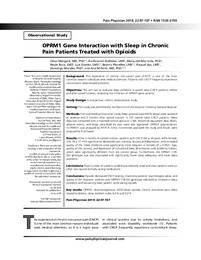Por favor, use este identificador para citar o enlazar este ítem:
https://hdl.handle.net/11000/32361Registro completo de metadatos
| Campo DC | Valor | Lengua/Idioma |
|---|---|---|
| dc.contributor.author | Margarit, César | - |
| dc.contributor.author | Ballester, Pura | - |
| dc.contributor.author | Inda, María del Mar | - |
| dc.contributor.author | Roca, Reyes | - |
| dc.contributor.author | Gomez, Luis | - |
| dc.contributor.author | Planelles, Beatriz | - |
| dc.contributor.author | Ajo Ferrer, Raquel | - |
| dc.contributor.author | Morales, Domingo | - |
| dc.contributor.author | Peiró, Ana | - |
| dc.contributor.other | Departamentos de la UMH::Farmacología, Pediatría y Química Orgánica | es_ES |
| dc.date.accessioned | 2024-06-27T11:29:27Z | - |
| dc.date.available | 2024-06-27T11:29:27Z | - |
| dc.date.created | 2019-01 | - |
| dc.identifier.citation | Pain Physician. 2019 Jan;22(1):97-107 | es_ES |
| dc.identifier.issn | 2150-1149 | - |
| dc.identifier.issn | 1533-3159 | - |
| dc.identifier.uri | https://hdl.handle.net/11000/32361 | - |
| dc.description.abstract | Background: The experience of chronic non-cancer pain (CNCP) is one of the most common reasons individuals seek medical attention. Patients with CNCP frequently experience concomitant sleep-related problems. Objectives: The aim was to evaluate sleep problems in opioid naïve CNCP patients, before and after opioid titration, analyzing the influence of OPRM1 gene variants. Study Design: A prospective, cohort, observational study. Setting: This study was performed at the Pain Unit of the Alicante University General Hospital. Methods: Pain and Medical Outcomes Study Sleep questionnaire (MOS-Sleep) were assessed at baseline and 3 months after opioid titration in 231 opioid naïve CNCP patients. Sleep data was compared with a matched-control group (n = 64). Morphine equivalent daily doses, adverse events, and drugs prescribed for pain were also registered. OPRM1 polymorphism rs1799971 was analyzed by RT-PCR. Ethics Committee approved the study and results were analyzed by R software. Results: After 3 months of opioid titration, patients with CNCP (63 ± 14 years, 64% female, VAS 74 ± 17 mm) significantly decreased pain intensity, anxiety and depression, and increased quality of life. Sleep problems were significantly more frequent in females (P = 0.002). Age, quality of life, anxiety, and depression all influenced sleep disturbances and problems indices, which were significantly different from the control group. Furthermore, the OPRM1 118- GG genotype was also associated with significantly lower sleep adequacy, and more sleep problems. Limitations: Total number of subjects studied was relatively small and most patients were on other non-opioid centrally-acting medications. Conclusions: Opioids decreased CNCP severity, improving patients’ psychological areas, and quality of life. However, patients with OPRM1 118-GG genotype indicated an increase in sleep problems and worsening sleep pattern while taking opioids. | es_ES |
| dc.format | application/pdf | es_ES |
| dc.format.extent | 12 | es_ES |
| dc.language.iso | eng | es_ES |
| dc.publisher | Paducah, Ky. : American Society of Interventional Pain Physicians | es_ES |
| dc.rights | info:eu-repo/semantics/openAccess | es_ES |
| dc.rights.uri | http://creativecommons.org/licenses/by-nc-nd/4.0/ | * |
| dc.subject | OPRM1 | es_ES |
| dc.subject | pharmacogenetics | es_ES |
| dc.subject | MOS-Sleep | es_ES |
| dc.subject | opioids | es_ES |
| dc.subject | chronic noncancer pain | es_ES |
| dc.subject | sleep related problems | es_ES |
| dc.subject | sleep problem index SLP-6 and SLP-9 | es_ES |
| dc.subject.other | CDU::6 - Ciencias aplicadas::61 - Medicina::615 - Farmacología. Terapéutica. Toxicología. Radiología | es_ES |
| dc.title | OPRM1 Gene Interaction with Sleep in Chronic Pain Patients Treated with Opioids | es_ES |
| dc.type | info:eu-repo/semantics/article | es_ES |

Ver/Abrir:
OPRM1 Gene Interaction with Sleep in Chronic.pdf
207,46 kB
Adobe PDF
Compartir:
 La licencia se describe como: Atribución-NonComercial-NoDerivada 4.0 Internacional.
La licencia se describe como: Atribución-NonComercial-NoDerivada 4.0 Internacional.
.png)